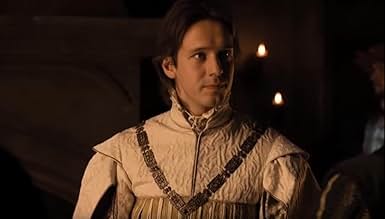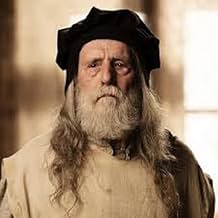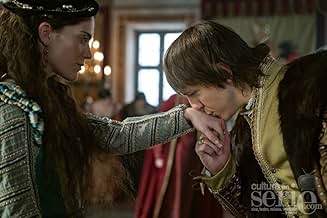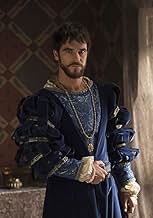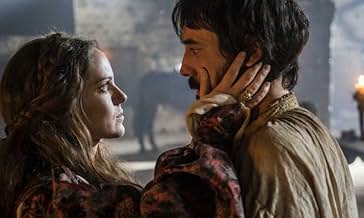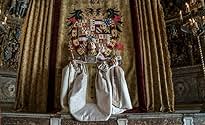Ajouter une intrigue dans votre langueThe Roman Catholic Church faces the new challenges of Protestanism in Northern Europe and Paganism in the Americas. Carlos V seeks to secure the power of the Church, in this continuation of ... Tout lireThe Roman Catholic Church faces the new challenges of Protestanism in Northern Europe and Paganism in the Americas. Carlos V seeks to secure the power of the Church, in this continuation of Isabel (2011-2014) and La Corona Partida (2016).The Roman Catholic Church faces the new challenges of Protestanism in Northern Europe and Paganism in the Americas. Carlos V seeks to secure the power of the Church, in this continuation of Isabel (2011-2014) and La Corona Partida (2016).
- Prix
- 7 victoires et 4 nominations au total
Parcourir les épisodes
Histoire
Le saviez-vous
- AnecdotesCarlos did not speak Castilian when he arrived to Castilla, even it is not showed in the series.
- ConnexionsFollowed by La corona partida (2016)
Commentaire en vedette
This TV series recreates faithfully the historical facts about Carlos I . Historical series about the great emperor of Spain and V of Germany, who ruled the crowns of Castile , including the Kingdom of Navarra and Aragon between 1516 and 1556 , and was also Emperor of the Holy Roman Empire from 1520 to 1558 . This TV series recreates faithfully the historical facts about Carlos I and other known characters as Francisco De Borja (Victor Clavijo) , Germana De Foix (Nathalie Poza) , Adriano De Utrecht (Francesc Orella) , Papa León X (Carlos Kaniowsky) , Leonardo Da Vinci (Carlos Álvarez-Nóvoa) , Tiziano , (Fernando Conde) , Francisco Cisneros (Eusebio Poncela) , Enrique VIII (Àlex Brendemühl) , Fernando De Habsburgo (Eric Balbàs) , Maria Pacheco , Ponce De León , Pizarro , Cardenal Thomas Wolsey , Catalina de Aragón , Jeromín (future Juan De Austria) , and , of course , Felipe II (Marcel Borràs) , as well as essential happenings : conquest by Castillian conquistadors of the Aztec and Inca empires, as Mexico conquest by Hernan Cortes (Jose Luis Garcia Perez) and his taking on Moctezuma (Christian Esquivel) , marriage to Mary Tudor (Angela Cremonte) , fights against French army , Saint Quentin , against Turks .. . This is the environment in which occurs intrigues , emotions , feats , betrayal and spectacular battles . Many years separate us from the events are to narrate , but the shadows still hide from the public this great historic moment , and the significance of such deeds .¨Carlos I¨ TV series is filled with those lights and shadows , gathers such very important known events recreated in the artistic frames , characterized and inspired by the ideas of a new world . The series contributes to historical , artistic and cultural memory of an era , with a look back to the past , offering us an interesting adaptation on important facts . This is an enough budget flick with a very good cast . Nice acting by Alvaro Cervantes as a great emperor whose willpower , tenacity and determination is well shown in the series and his first wife Isabel de Portugal , Blanca Suárez , who gives a convincing character as sensitive and intelligent queen , she is marvelously photographed throughout and gives her big opportunity to really shine . Support cast is pretty well ; as Alfonso Bassave is fine as astute Francisco I , Víctor Clavijo as Francisco De Borja , Irene Montalà as Isabel De Osorio , Mónica López as Margarita De Habsburgo , Laia Costa as María De Austria , Fadrique De Alba (Ramón Barea) . And special mention for Laia Marull as Juana I De Castilla . The series displays a breathtaking as well as evocative musical score by Federico Jusid . Colorful and atmospheric cinematography by David Azcano and Alfonso Segura . Being compellingly directed by Oriol Ferrer , Salvador García Ruiz and Jorge Torregrossa .
This costumer movie is well based on real events , these are the followings : Charles I was born in 1500 and died in 1558 . Carlos was the grandson of Ferdinand (Rodolfo Sancho) and Isabella (Michelle Jenner) and son of Philip the Handsome and Joanna I of Castile (Irene Escolar and Laia Marull) . Charles become the most powerful man in Europe, despite the hostility that surrounds it and the large size of its rivals such as Francisco I and Enrique II of France . He was ruler of the Spanish Empire from 1516 and Holy Roman Emperor from 1519, until he voluntarily stepped down from these and other positions by a series of abdications between 1554 and 1556 . Through inheritance, he brought together under his rule extensive territories in central, western, and southern Europe, and the Spanish colonies in the Americas and Asia . As a result, his domains spanned nearly four million square kilometers , and were the first to be described as "the empire on which the sun never sets". His reign was dominated by war, and particularly by three major simultaneous conflicts : the Habsburg-Valois Wars with France, the struggle to halt the Ottoman advance, and the Protestant Reformation resulting in conflict with the German princes . The wars with France, mainly fought in Italy, resulted in recovery of territory lost at the beginning of his reign and included the decisive defeat and capture of Francis I of France at the Battle of Pavia in 1525. France recovered and the wars continued for the remainder of Charles's reign. Enormously expensive , they led to the development of the first modern professional army in Europe, the Tercios. The struggle with the Ottoman Empire was fought in Hungary and the Mediterranean . After seizing most of eastern and central Hungary in 1526, the Ottomans' advance was halted at their failed Siege of Vienna in 1529.Charles was unable to prevent the Ottomans' increasing naval dominance and the piratical activity of the Barbary Corsairs . Charles opposed the Reformation and in Germany he was in conflict with the Protestant Princes of the Schmalkaldic League who were motivated by both religious and political opposition to him. He could not prevent the spread of Protestantism and although he won a decisive victory against the Princes at the Battle of Mühlberg, 1547, he was ultimately forced to concede the Peace of Augsburg of 1555 which divided Germany on confessional lines. Charles was only 56 when he abdicated, but after 34 years of energetic rule he was physically exhausted and sought the peace of a monastery of Yuste where he died at the age of 58 .
This costumer movie is well based on real events , these are the followings : Charles I was born in 1500 and died in 1558 . Carlos was the grandson of Ferdinand (Rodolfo Sancho) and Isabella (Michelle Jenner) and son of Philip the Handsome and Joanna I of Castile (Irene Escolar and Laia Marull) . Charles become the most powerful man in Europe, despite the hostility that surrounds it and the large size of its rivals such as Francisco I and Enrique II of France . He was ruler of the Spanish Empire from 1516 and Holy Roman Emperor from 1519, until he voluntarily stepped down from these and other positions by a series of abdications between 1554 and 1556 . Through inheritance, he brought together under his rule extensive territories in central, western, and southern Europe, and the Spanish colonies in the Americas and Asia . As a result, his domains spanned nearly four million square kilometers , and were the first to be described as "the empire on which the sun never sets". His reign was dominated by war, and particularly by three major simultaneous conflicts : the Habsburg-Valois Wars with France, the struggle to halt the Ottoman advance, and the Protestant Reformation resulting in conflict with the German princes . The wars with France, mainly fought in Italy, resulted in recovery of territory lost at the beginning of his reign and included the decisive defeat and capture of Francis I of France at the Battle of Pavia in 1525. France recovered and the wars continued for the remainder of Charles's reign. Enormously expensive , they led to the development of the first modern professional army in Europe, the Tercios. The struggle with the Ottoman Empire was fought in Hungary and the Mediterranean . After seizing most of eastern and central Hungary in 1526, the Ottomans' advance was halted at their failed Siege of Vienna in 1529.Charles was unable to prevent the Ottomans' increasing naval dominance and the piratical activity of the Barbary Corsairs . Charles opposed the Reformation and in Germany he was in conflict with the Protestant Princes of the Schmalkaldic League who were motivated by both religious and political opposition to him. He could not prevent the spread of Protestantism and although he won a decisive victory against the Princes at the Battle of Mühlberg, 1547, he was ultimately forced to concede the Peace of Augsburg of 1555 which divided Germany on confessional lines. Charles was only 56 when he abdicated, but after 34 years of energetic rule he was physically exhausted and sought the peace of a monastery of Yuste where he died at the age of 58 .
- ma-cortes
- 31 janv. 2016
- Lien permanent
Meilleurs choix
Connectez-vous pour évaluer et surveiller les recommandations personnalisées
- How many seasons does Charles, Emperor King have?Propulsé par Alexa
Détails
- Date de sortie
- Pays d’origine
- Langue
- Aussi connu sous le nom de
- Charles, Emperor King
- société de production
- Consultez plus de crédits d'entreprise sur IMDbPro
- Couleur
Contribuer à cette page
Suggérer une modification ou ajouter du contenu manquant


![Regarder Promo [OV]](https://m.media-amazon.com/images/M/MV5BNWYwN2JmYzQtMTkxZS00ZmRmLWIzMDUtMjYwNjdhMzFiZWViXkEyXkFqcGdeQWdhbWF6b2E@._V1_QL75_UX500_CR0)
